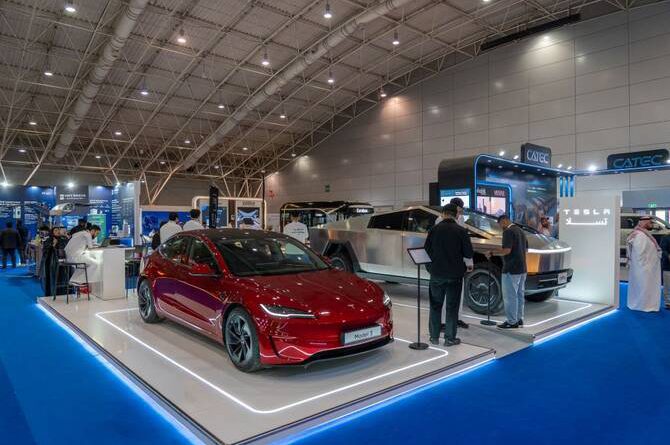Saudi Arabia accelerates efforts to build a fully localized EV charging network to power a sustainable future
Riyadh – Saudi Arabia is rapidly advancing toward its vision of becoming a global leader in sustainable mobility, with focused efforts underway to build a fully localized electric vehicle (EV) charging network.
This initiative represents a key step in the Kingdom’s broader strategy to diversify its economy, reduce carbon emissions, and establish a world-class green transportation ecosystem in line with Vision 2030.
At the forefront of this transformation is Smart Mobility, a joint venture between China’s Foxconn Interconnect Technology and Saudi Arabia’s Saleh Suleiman Al-Rajhi and Sons.
The company is pioneering the development of Saudi Arabia’s first locally produced EV charging network — integrating hardware, software, and manufacturing to create a system tailored to the Kingdom’s unique environmental and logistical conditions.
According to Ben Jia, Vice President of Sales at Smart Mobility, the company’s mission is to merge global expertise with Saudi innovation.
“Our mission is to bring our experience from China and Europe to establish a Saudi-based charging manufacturer,” he said.
“We want to create solutions designed for Saudi heat, Saudi users, and Saudi roads. This market has unique challenges, and we are engineering around them.”
Saudi Arabia’s growing EV market has attracted both local and international players, highlighting the nation’s commitment to sustainable transportation.
Smart Mobility’s work demonstrates how strategic partnerships and localized production can help meet the Kingdom’s long-term sustainability goals.
By producing chargers domestically, the company aims not only to reduce dependence on imports but also to enhance local job creation and industrial capability.
A significant milestone in this journey came when Smart Mobility signed a memorandum of understanding (MoU) with Al-Bassami Transport Group, one of Saudi Arabia’s leading logistics companies.
The agreement focuses on electrifying the country’s logistics sector, starting with a pilot project that includes installing charging stations at Al-Bassami’s headquarters, followed by expansion across its logistics hubs nationwide.
“Fleet electrification is the fastest path to EV adoption in Saudi Arabia,” Jia explained. “By working with logistics leaders like Al-Bassami, we can prove that electric transport isn’t just sustainable — it’s commercially viable. Once the model works for logistics, it can expand to other sectors.”
The collaboration underscores how private-sector partnerships are driving innovation in Saudi Arabia’s evolving energy and transport sectors.
As more companies align with the nation’s sustainability agenda, localized manufacturing and technology development are expected to create ripple effects across industries — from renewable energy and battery production to smart infrastructure and digital mobility platforms.
Smart Mobility’s next major step will be the unveiling of its “Saudi Made” EV charger factory design before the end of 2025.
This project will pave the way for the establishment of the first Foxconn EV charging equipment factory in the Middle East, marking a historic advancement for the region’s manufacturing sector.
The company has already begun shipping chargers from Taiwan and China to support the initial stages of deployment.
However, local production is expected to begin soon, creating a robust supply chain within the Kingdom. “We’ve already started shipping chargers from Taiwan and China, but soon we’ll be making them right here in Saudi Arabia,” Jia said.
“It’s about building capability, not just importing technology.”
As Saudi Arabia continues to invest in renewable energy, advanced infrastructure, and electric mobility, initiatives like Smart Mobility’s localized EV charging network will play a vital role in shaping the country’s green future.
With growing collaborations between international innovators and Saudi companies, the Kingdom is steadily positioning itself as a hub for clean technology in the Middle East — driving progress that aligns with its vision for a sustainable, diversified economy.



